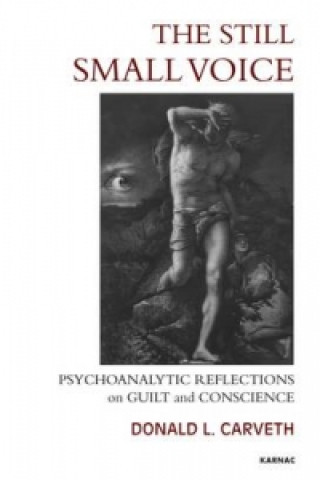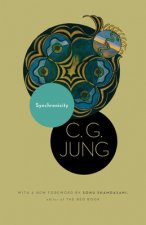
Kod: 01992273
Still Small Voice
Autor Donald L Carveth
Whereas Freud himself viewed conscience as one of the functions of the superego, in The Still Small Voice: Psychoanalytic Reflections on Guilt and Conscience, Carveth argues that superego and conscience are distinct mental functio ... więcej
- Język:
 Angielski
Angielski - Oprawa: Miękka
- Liczba stron: 352
Wydawca: Taylor & Francis Ltd, 2013
- Więcej informacji o książce

Zobacz książki o podobnej tematyce
-

Can't Hurt Me
132.16 zł -

Graveyard Book
34.64 zł -14 % -

Young's Analytical Concordance to the Bible
84.61 zł -7 % -

Hip Hop Coloring Book
38.27 zł -23 % -

Rachmaninov: Sheet Music for Piano
47.34 zł -23 % -

Beaches
185.75 zł -5 % -

Ballenesque
360.53 zł -

The Beginner's Photography Guide
84.61 zł -7 % -

Piezoelectric Sensors and Actuators
1282.08 zł -

Alone
70 zł -23 % -

Philip K. Dick's Electric Dreams
81.18 zł -10 % -

Problems in Real Analysis
588 zł -

Febrile Neutropenia
288.60 zł -

Rainwater Infiltration in Urban Areas
588.10 zł
Podaruj tę książkę jeszcze dziś
- Zamów książkę i wybierz "Wyślij jako prezent".
- Natychmiast wyślemy Ci bon podarunkowy, który możesz przekazać adresatowi prezentu.
- Książka zostanie wysłana do adresata, a Ty o nic nie musisz się martwić.
Więcej informacji o Still Small Voice
Za ten zakup dostaniesz 172 punkty
 Opis
Opis
Whereas Freud himself viewed conscience as one of the functions of the superego, in The Still Small Voice: Psychoanalytic Reflections on Guilt and Conscience, Carveth argues that superego and conscience are distinct mental functions and that, therefore, a fourth mental structure, the conscience, needs to be added to the psychoanalytic structural theory of the mind. He claims that while both conscience and superego originate in the so-called pre-oedipal phase of infant and child development they are comprised of contrasting and often conflicting identifications. The primary object, still most often the mother, is inevitably experienced as, on the one hand, nurturing and soothing and, on the other, as frustrating and persecuting. Conscience is formed in identification with the nurturer; the superego in identification with the aggressor. There is a principle of reciprocity at work in the human psyche: for love received one seeks to return love; for hate, hate (the talion law).Like Franz Alexander and Sandor Ferenczi before him, Carveth views the therapeutic task as elimination of the superego. But unlike his forebears he does not propose its replacement by the rational ego for, in his view, rationality cannot serve as the source of values. Following Jean-Jacques Rousseau, he finds the roots of morality not in reason but in feeling, in sympathetic identification or "pity." With Pascal, he holds that "the heart has reasons reason cannot know." Such "reasons of the heart" form the core of conscience. Unlike the torments inflicted by the demonic superego that merely uses transgression as an excuse to do what it wants-punish and torment the ego-the conscience, what Winnicott called "the capacity for concern," is genuinely troubled by failures to love. The author claims we must face our bad conscience, acknowledge and bear genuine (depressive) guilt, and through contrition, repentance and reparation come to accept reconciliation and forgiveness, or be forced to suffer the torments of the damned-persecutory guilt inflicted by the sadistic internal persecutor and saboteur, the superego.It is the author's view that in human history the damage done by id-driven psychopaths amounts to nothing compared to that brought about by superego-driven ideologists. Freud and subsequent psychoanalysis has largely whitewashed the superego while demonising the id, the alleged "beast" in man, when in reality animals are seldom beastly, at least not in the ways humans often are. While aware of its destructiveness in the clinical realm, psychoanalysts have largely ignored the ideologies of domination-the sexism, racism, heterosexism, classism and childism-that are internalised from unconscionable societies into the unconscionable superego.In the penultimate chapter, drawing on the work of Hannah Arendt, Terry Eagleton and others, Carveth critically reviews the concepts of psychopathy and evil. In the final chapter, he advocates a demythologising, deliteralising or deconstructive approach to the Bible as metaphor, but one that escapes Freud's derogation of this approach by acknowledging, with Hegel at his most honest, that its result is a humanistic ethic no longer to be equated with religion.
 Szczegóły książki
Szczegóły książki
Kategoria Książki po angielsku Society & social sciences Psychology Psychological theory & schools of thought
295.96 zł
- Pełny tytuł: Still Small Voice
- Autor: Donald L Carveth
- Język:
 Angielski
Angielski - Oprawa: Miękka
- Liczba stron: 352
- EAN: 9781780491684
- ISBN: 1780491689
- ID: 01992273
- Wydawca: Taylor & Francis Ltd
- Waga: 538 g
- Wymiary: 156 × 229 × 33 mm
- Data wydania: 01. June 2013
Ulubione w innej kategorii
-

The Empathy Game
104.15 zł -7 % -

Red Book
1161.70 zł -6 % -

A General Introduction to Psychoanalysis
24.57 zł -23 % -

Inner Gold
103.55 zł -

Ego and the Id
15.30 zł -23 % -

Man's Search for Meaning, Gift Edition
101.13 zł -12 % -

Secret World of Drawings
88.74 zł -23 % -

Psychoanalytic Diagnosis
237.63 zł -

Situation Is Hopeless But Not Serious
69 zł -6 % -

Analysis, Repair and Individuation
294.75 zł -

Dark Side of the Inner Child
118.26 zł -1 % -

Archetypal Process
169.93 zł -

Ape that Understood the Universe
129.64 zł -5 % -

Four Archetypes
98.31 zł -5 % -

Between Losing and Finding
132.56 zł -

Threshold Experiences
166.51 zł -

Social Psychology: A Very Short Introduction
57.51 zł -5 % -

Behave
54.09 zł -15 % -

The Red Book – A Reader`s Edition
182.63 zł -7 % -

Emotional Intelligence
47.04 zł -7 % -

Synchronicity – An Acausal Connecting Principle
56.50 zł -

The Sublime Object of Ideology
74.33 zł -9 % -

Memories, Dreams, Reflections
62.15 zł -3 % -

Make It Stick
164.09 zł -

Civilization and Its Discontents
42.90 zł -23 % -

Choice Factory
70.41 zł -23 % -

No Boundary
69.70 zł -10 % -

Problem of the Puer Aeternus
103.35 zł -

Answer to Job
45.52 zł -4 % -

Carl Jung: Wounded Healer of the Soul
116.24 zł -23 % -

Psychoanalyst Meets Marina Abramovic
78.47 zł -4 % -

The Interpretation of Dreams
27.99 zł -3 % -

Dreams
86.73 zł -

Ego and Archetype
111.71 zł -23 % -

Great Mother
123.80 zł -6 % -

How To Read Lacan
51.87 zł -23 % -

Integral Psychology
103.55 zł -10 % -

Archetypes and the Collective Unconscious
245.99 zł -

Freud and Beyond
102.34 zł -

Home is Where We Start from
61.14 zł -23 % -

Jung's Studies in Astrology
223.02 zł -

Projection and Re-collection in Jungian Psychology
133.77 zł -4 % -

Dreams
93.88 zł -1 % -

Beyond the Pleasure Principle
61.14 zł -23 % -

Red Book of C.G. Jung
194.72 zł -

Quantum Mind
138.91 zł -

Ecrits
145.56 zł -5 % -

Civilization and its Discontents
35.35 zł -3 % -

Why We Buy
81.18 zł -10 %
zadowolonych klientów
Od roku 2008 obsłużyliśmy wielu miłośników książek, ale dla nas każdy był tym wyjątkowym.
Copyright! ©2008-24 libristo.pl Wszelkie prawa zastrzeżonePrywatnieCookies



 21 milionów książek
21 milionów książek Dostawa 10.99 zł
Dostawa 10.99 zł (32) 444 93 66 (8-15.30h)
(32) 444 93 66 (8-15.30h)